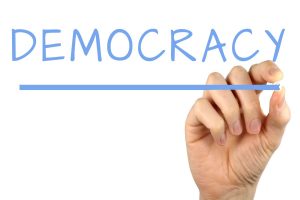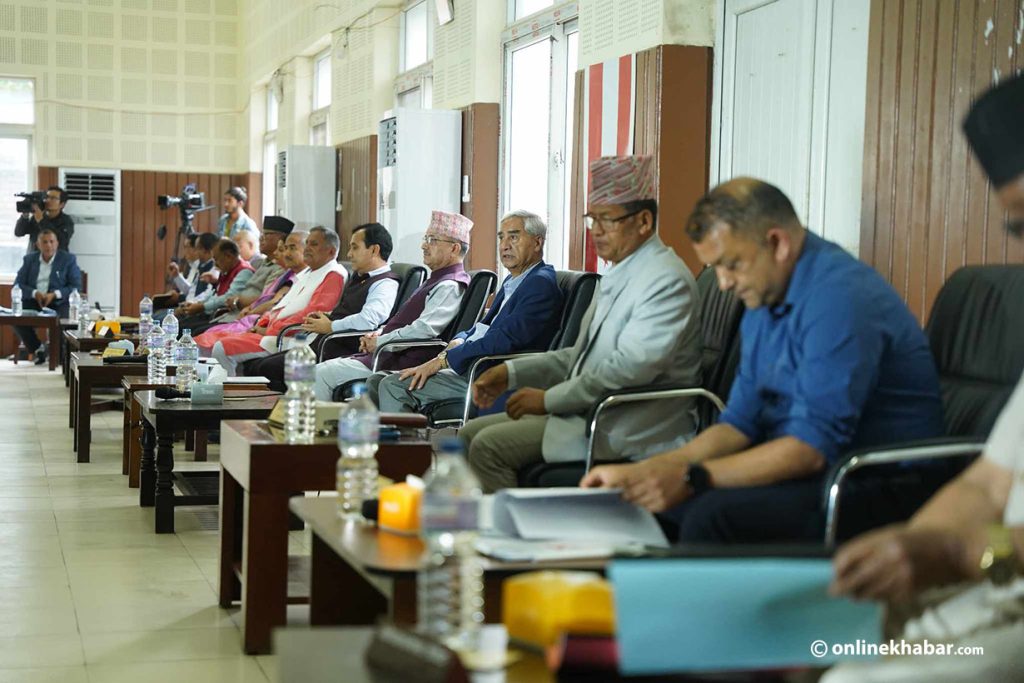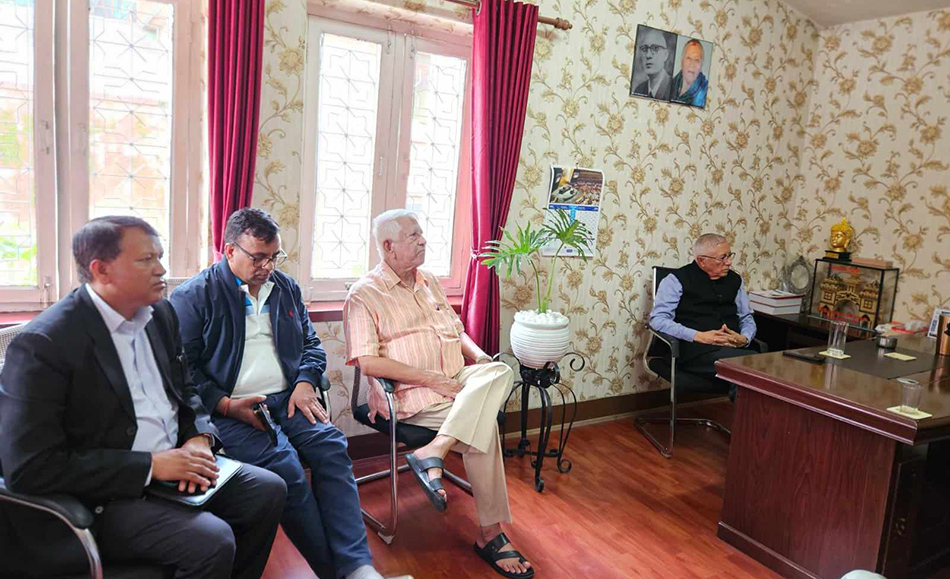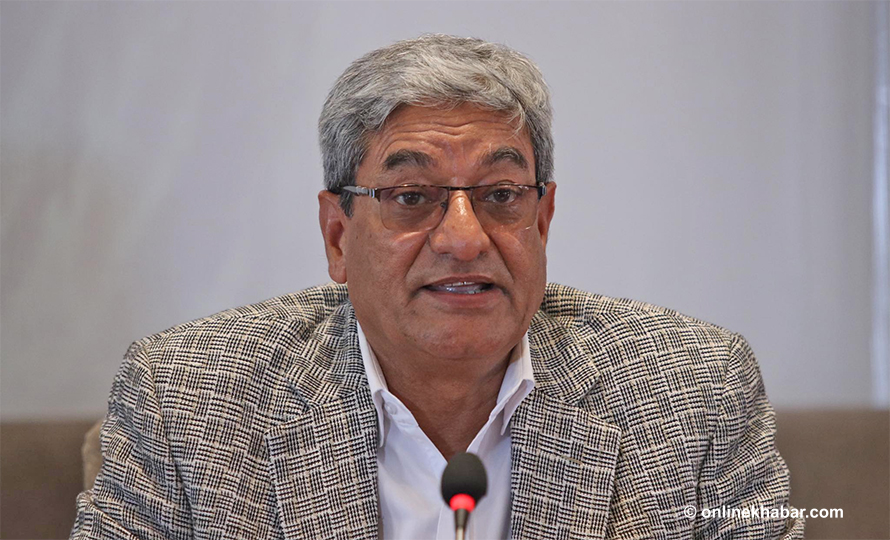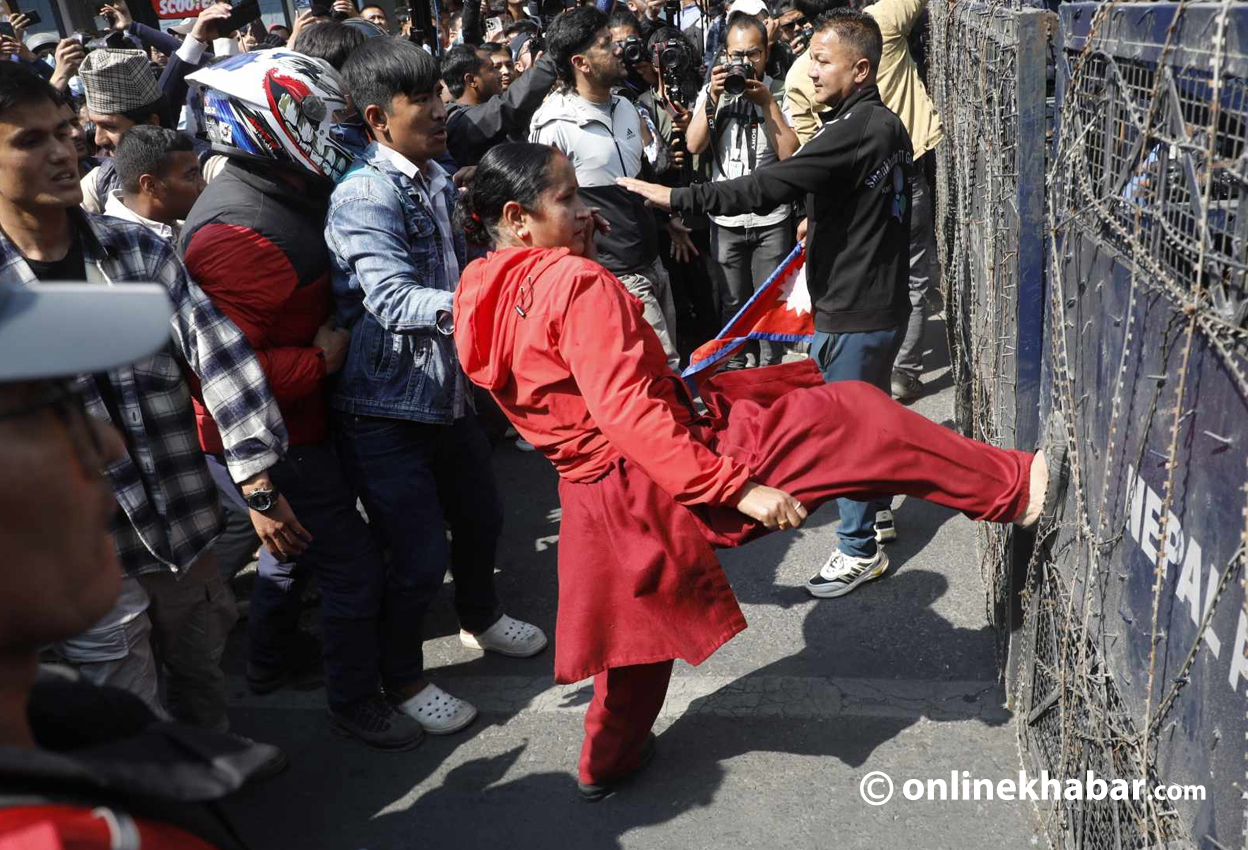
Nepali Congress President Sher Bahadur Deuba is often observed as a reserved speaker who listens attentively. However, his tendency to make independent decisions contradicts the perception that he is a careful listener, creating a conflict in his actions.
Examining Sher Bahadur Deuba’s most recent decisions provides a basis for evaluation.
TikTok ban
Prime Minister Pushpa Kamal Dahal, along with Deuba and the chair of the main opposition party UML, KP Sharma Oli, played a key role in creating an environment to ban TikTok.
The need to regulate the widespread vulgarity on TikTok was deemed imperative. However, Deuba did not engage in consultations regarding this decision with the party members. Consequently, two General Secretaries, Gagan Thapa and Biswa Prakash Sharma, along with many other leaders of the Nepali Congress, opposed the approval provided by the party president. Consequently, his stance did not align with the institutional opinion of the Nepali Congress.
On November 7, Prime Minister Dahal called a meeting with the then-seven parties and the Maoists (12-member group), who were actively spearheading the peace process. Accompanied by Krishna Prasad Sitaula, a key figure in the peace process, Deuba attended the meeting at Singhadarbar. On that very day, the government announced the TikTok ban, and notably, Deuba did not voice any objections to this decision.
Why? It can be said that Sher Bahadur Deuba has not been a fan of the platform that has vilified him and his family over the past year.

In April, Deuba acknowledged that the party faced an escalating wave of attacks on social media. It was said that organised social media assaults hindered the party and its leaders from securing victory in Tanahun-1. Despite existing perceptions within the party regarding social media, Deuba’s independent decision to ban TikTok carries particular significance for the Nepali Congress.
Deuba provided a ‘green signal’ to the government for the TikTok ban without deeming it necessary to discuss the matter within the party or convene a meeting of officials. Contrary to PM Dahal’s assertion that all parties supported the decision, Gagan Thapa promptly contradicted the Prime Minister’s statement a day after the TikTok ban was implemented.
Thapa questioned the Prime Minister through social media, asking, “Where and when has there been a discussion within our party Nepali Congress? When and where has there been consensus? Who and how was the consensus made?”
Sher Bahadur Deuba rarely includes General Secretaries Thapa and Sharma in discussions with PM Dahal, and they claim that any agreement between the Prime Minister and Deuba only becomes evident through media disclosure. Thapa says that supporting a decision made without informing or discussing it within the party is not feasible.
In a cautionary tone directed at Deuba, Thapa says, “The party is not the private company of the party president, any of his opinion should not be a party’s opinion, internal discussions should take place within the party.”
Thapa stated that he met with PM Dahal and inquired about the rationale behind considering the discussion at Baluwatar as an alliance meeting before recent decisions, including the TikTok ban. The party’s leaders have voiced their opposition to Deuba’s actions since he adopted the policy of abstaining from the decision-making process.
Ambassador appointments
The government’s choice to establish a Nepali embassy in Portugal and nominate Sunil Nepal as the ambassador was made on November 9. Nepal has a close association with Nepali Congress politician Dr Shashank Koirala.
Party leaders have indicated that there was no internal discussion within the party regarding the appointment of the ambassador. This is consistent with the observation that Sher Bahadur Deuba has not been following the institutional system for making appointments.
Undemocratic decision-making within the party

As per the Nepali Congress’s statute, the president exerts “unlimited” power. However, party leaders argue that despite various positions within the Central Committee, internal cohesion has not been fortified when all authority is concentrated in the hands of the president.
Critics contend that the party has weakened due to the perceived misuse of powers by Sher Bahadur Deuba. They point to instances where Deuba has overlooked other perspectives in decisions related to central to provincial ministers, nominations for fraternal organisation presidents, appointments of parliamentary committee chairpersons, and the expansion of the central committee.
Congress leaders are commenting that not having internal discussions on some issues before making a decision has had a long-term impact on the party. There is an understanding within the party that due to the lack of internal discussion in the decision-making process, the party has to suffer.
Central member Shyam Ghimire says there is a problem in the party due to a lack of internal discussion on serious issues.
“We are not even able to give clear opinions on issues”, says Ghimire, “It is my understanding that the lack of discussion has led to serious problems.”
Gagan Thapa vehemently objected to Deuba’s operational approach, questioning, “Shouldn’t there be a discussion about the individuals he wishes to appoint? For the party’s well-being, there should be a discourse on the suitability of the individuals he intends to appoint.”
According to other leaders, Sher Bahadur Deuba appears unwilling to engage in discussions about the individuals he endorses for various responsibilities within the party.
Nominating central members solely and selecting ministers on a whim
The statute of the Nepali Congress has given the party president the right to nominate 33 central members. But, Sher Bahadur Deuba has appointed five people to the central committee, a move that goes against the party’s regulations. According to the party’s rules, individuals who face defeat in the inter-party election at the lower level are not eligible for inclusion in the central committee.
Arjun Prasad Joshi, Bharat Shah, Kiran Raj Sharma, Laxmi Khatiwada and Ganga Shahi, who lost during the last convention, were made central members by Deuba. The leaders sought the president’s answer by showing the provisions of the law. Deuba did not care and went ahead anyway.
The party leadership has been resistant to endorsing the president’s unilateral approach in significant decisions. Concerns have been raised about the damage incurred by the party as a result of not adhering to the constitutional framework and rejecting the collective leadership system.
Leaders within the party express the sentiment that Sher Bahadur Deuba appears disconnected from the concerns and grievances of ordinary citizens. Consequently, other leaders at the Nepali Congress find themselves compelled to respond to his decisions, shaping the fate of the party.
“The president does not care what the citizens are saying about the decisions he has made, but we do,” says a member of the Nepali Congress on the condition of anonymity. “He takes the decision but it is we who have to be answerable to the public. We don’t think it is fair.”
This story was translated from the original Nepali version and edited for clarity and length.






